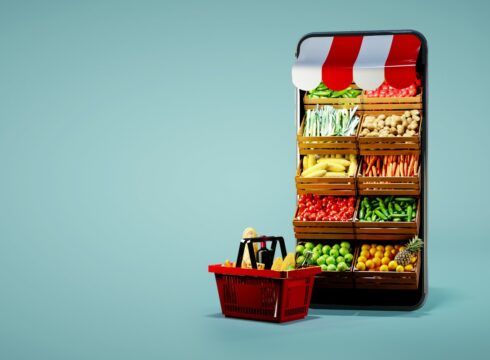A report by RedSeer Consulting has revealed that the online grocery segment is growing at 57% CAGR, and from a GMV of $1.9 Bn last year, could record $3 Bn GMV this year
The report attributes the growth in online grocery shopping to shift in consumer behaviour amid the pandemic and the entry of big players such as Reliance in the space
Online grocery is expected to reach a market size of $18 Bn by 2024, and constitute 2.3% of the overall food and grocery market in India
Inc42 Daily Brief
Stay Ahead With Daily News & Analysis on India’s Tech & Startup Economy
Amid the pandemic, businesses have evolved their strategies to suit the changed needs of customers. For ecommerce companies in India, this has meant tapping into the demand for online grocery. And if a recent report by management consulting firm RedSeer is to be believed, online grocery could be the next battleground for growth for some of the leading etailers such as Amazon, Flipkart, Reliance and BigBasket, among others.
The report, titled “Online Grocery: What Brands Need To Know“, mentions that the online grocery market in India, which had recorded $1.9 Bn GMV (gross merchandise value) in 2019, could grow to $3 Bn GMV by the end of this year. This growth can be attributed to several factors, chief being the Covid-19 tailwinds for the segment. Online grocery stores witnessed a rise in demand while countrywide lockdown restrictions were in place.
The report adds that the change in consumer behaviour amid the pandemic, and an increased preference among some customers for online grocery is likely to stick. This would help the online grocery stores increase their share in the overall food and grocery market from 0.3% last year to 2.3% by 2024, as the online grocery segment is growing at a CAGR of 57%.
Further, online grocery is expected to reach a market size of $18 Bn by 2024. The report mentions that the strong outlook for its growth is because of the stabilisation of business models and strong uptake in both metros and smaller cities driven by growing selection, offers and innovative business models.
Moreover, among the three players in the food and grocery market — traditional retail (brick and mortar stores), modern retail and online grocery — it is the online grocery segment which is growing at the fastest pace and will lead the growth for the sector, along with traditional retail, which is expected to dominate the market for quite some time with a market share of around 91% in the 2024 estimates.
The report adds that among the significant drivers for the growth of the online grocery segment in India will be the recent entry of big players such as Reliance. The Mukesh Ambani-led company launched the JioMart app on the Play Store and App Store in July this year and hit 1 Mn downloads within a week of the launch. According to the report, the entry of bigger players such as Reliance, and established ecommerce operators Flipkart and Amazon, among others, will drive the adoption of online grocery in Tier 2 cities, a large and relatively untapped market.
The report also cites logistical challenges faced by online grocery stores in the initial days of the Covid-19 induced lockdown in the country, which have been overcome to record high growth. While the category, as a whole, grew 73% during the lockdown, online sales of fresh vegetables and fruits have grown by 144% while FMCG products have grown by 150%.
Two of the earliest proponents of the online grocery model in India, BigBasket and Grofers, witnessed a surge in demand and sales during the lockdown. While BigBasket reported a 35% increase in sales in April, Grofers registered a 60% increase in its GMV, compared to pre-Covid-19 levels.
Challenges With Grocery Delivery
However, there are a few challenges inherent in the online grocery delivery model. The commissions in the grocery delivery space aren’t as attractive as compared to what food delivery startups such as Zomato get with the delivery of cooked food. The low order value also makes it very difficult for hyperlocal delivery players to actually make anything substantial out of it. Other problems include stock management as most of the retailers often don’t update the stock while taking orders
Zomato, which entered the online grocery delivery space in April with the launch of ‘Zomato Market’, wrapped up the business just two months later. This despite the company’s COO of food delivery Mohit Sardana telling Inc42 in April that the company had all the factors in place to sustain the new business model. “Grocery delivery has always been on our long term radar since it fits into our vision of ‘better food for more people’. Given the current need of our customers, we quickly sprung into action to serve,” Sardana had said.
Despite these challenges, Indian foodtech unicorn Swiggy is scaling up its online grocery delivery service Swiggy Stores. Last month, Inc42 reported that Swiggy had launched the pilot for InstaMart, a convenience grocery offering, through which, the company is looking to offer the fastest deliveries in the segment, under 30-45 minutes, with day and night serviceability.
Note: We at Inc42 take our ethics very seriously. More information about it can be found here.


